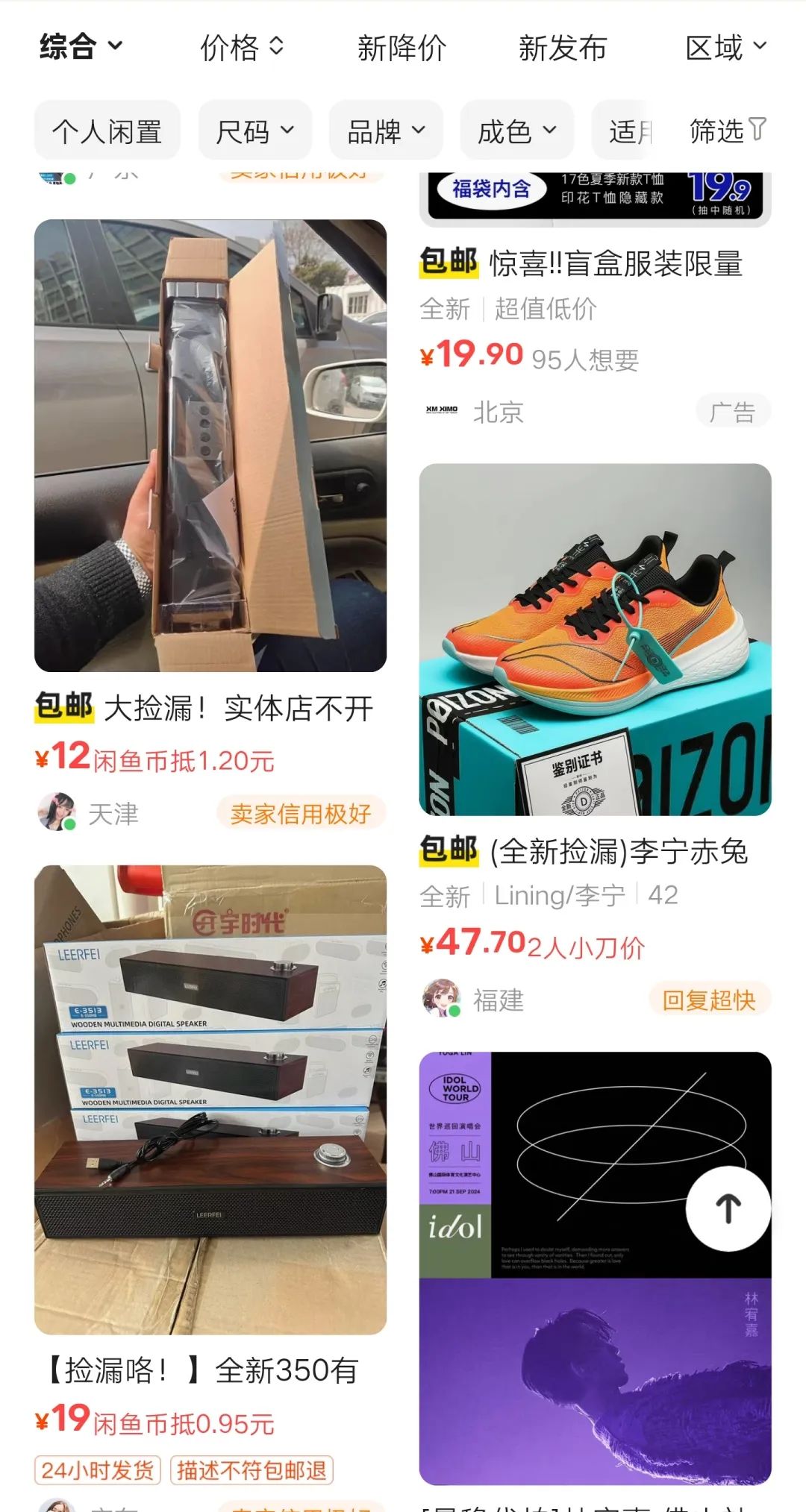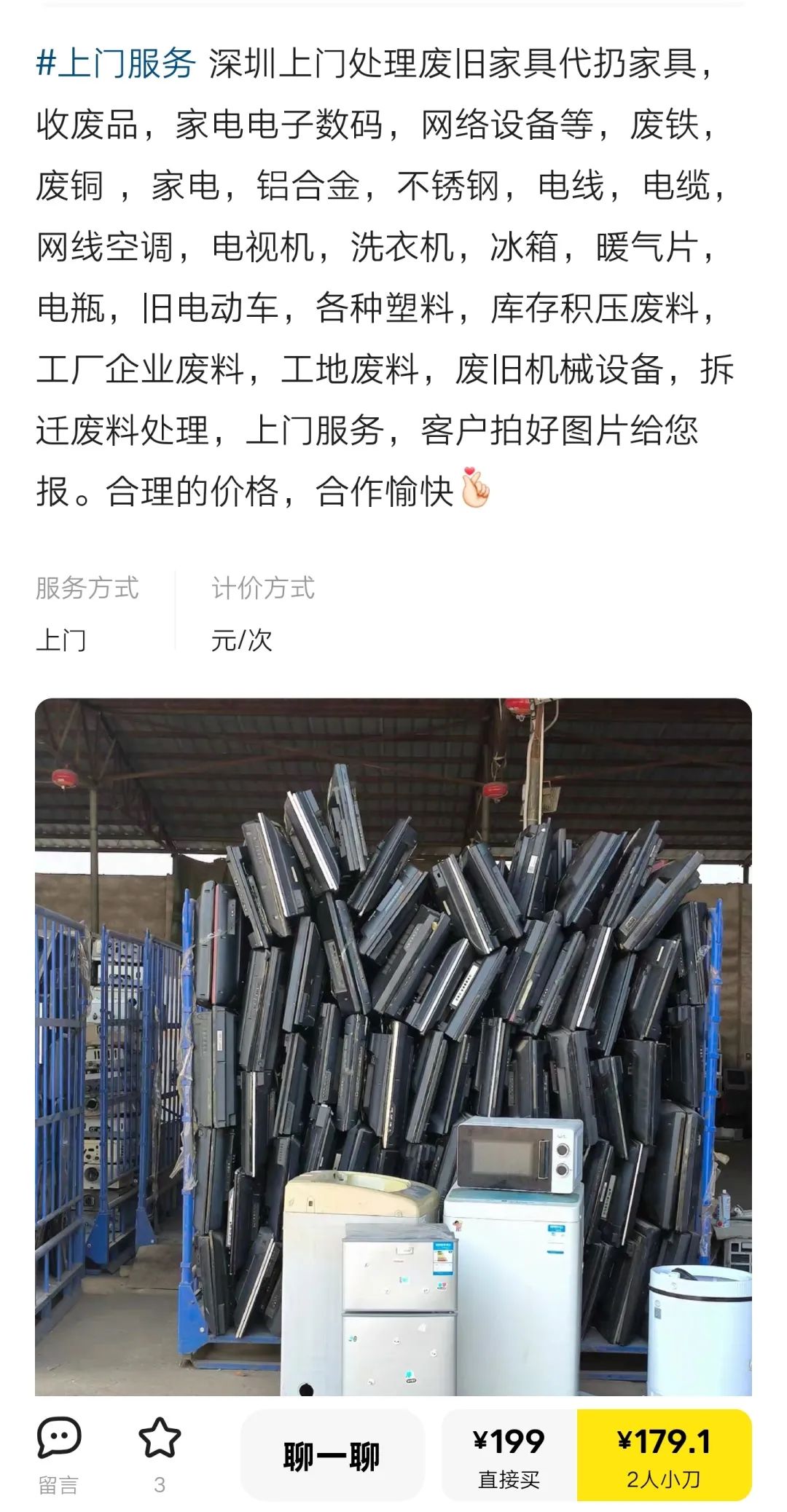XiaoHongShu and XianYu will inevitably face off
![]() 08/16 2024
08/16 2024
![]() 649
649

Starting from the perspective of a seller, let's discuss a trading scenario:
Suppose you're selling your Beijing home and want to sell your still-new furniture to make some extra money. You have a set of red oak furniture (wardrobe and bed) in your bedroom, which you bought from Red Star Macalline for 16,000 yuan. You list it on XianYu for over 4,000 yuan.
At the same time, you also post the information on XiaoHongShu with only pictures but no price tag. Surprisingly, despite having just over 100 followers, you receive enthusiastic replies and inquiries.
You decide to raise the price by a few hundred yuan on XianYu, but there are no takers. Meanwhile, inquiries keep flooding in on XiaoHongShu. Without a fixed price, you have more flexibility in pricing and can even choose to sell to the highest bidder.
The question is: In this scenario, which platform would you choose to continue selling on?
This is a true story my wife recently encountered, though she was one of those looking to buy furniture. She contacted the seller on XiaoHongShu and coincidentally stumbled upon the same person on XianYu. However, she noticed that the seller quickly took down the listing on XianYu and stopped responding to inquiries on XiaoHongShu.
'She must have found a higher bidder on XiaoHongShu,' my wife lamented. Finding the right furniture at the right time and price is as challenging as finding a new job for a middle-aged person.
This got me thinking about XiaoHongShu and XianYu.
These two platforms are not only my most familiar but also the only two e-commerce platforms I've delved deeply into. Each has its strengths, and they currently contribute roughly equal monthly GMV for me. In my opinion, XiaoHongShu and XianYu are destined to face off head-to-head someday.
01
What Makes a Good 'Field'?
In 234 AD, the great strategist Zhuge Liang passed away. Just over 40 years had passed since the rise of heroes who banded together to overthrow Dong Zhuo, and there were still 56 years left before the fall of Wu and Shu kingdoms and the end of the Three Kingdoms era.
Many people's understanding of the Three Kingdoms era stops at the heroic first half with Zhuge Liang alive, while the second half feels like it's been fast-forwarded, with little presence. For decades, the three kingdoms seemed to have reached a temporary truce, without large-scale military campaigns like the Battle of Guan Du, the Battle of Red Cliffs, or the Battle of Yiling.
However, in reality, the second half of the 50-year period was just as intense and even darker, filled with palace intrigues, power struggles, family bloodshed, and regicides.
This shift isn't due to a change in people but in the 'field.' A similar transformation may be underway in the e-commerce industry.
When the 'field' that guides the era loses its direction, people and products fall into disarray and misalignment.
'People, products, and field' is a popular methodology in the e-commerce industry. However, maintaining a balance among these three is challenging in practice because both people and products are dependent on the field. The field, composed of numerous micro-fields, is both a participant and rule-maker in business operations.
From a commercial perspective, the field will establish rules that benefit itself. As the traffic allocator and platform manager, the field has significant control over people and products. This is why when the field becomes confused, people and products suffer.
From an operator's perspective, a good 'field' should have at least three characteristics:
1. It benefits most people.
2. Paying players can buy costumes and props but cannot control traffic distribution. (Refer to the balance design between paying and regular players in online games.)
3. It respects merchants. Avoid platforms that treat merchants poorly with penalties and fines; it's best to steer clear of such platforms.
The second and third points are relatively easy to identify by understanding the platform's merchant operation rules. The first point, however, deserves more attention, with the keyword being 'organic traffic.'
I often hear colleagues complain about inconsistent traffic flow. They're referring to organic traffic, which is free traffic in contrast to paid traffic. The traffic pool comprises both paid and free traffic, which are inversely proportional. As paid traffic increases, free traffic decreases, especially during promotional events like 618, which negatively impacted my business in June and July.
Paid traffic operates on a bidding mechanism, where the highest bidder wins. Those who can monetize traffic effectively are willing to pay more. However, this can lead to the 'bad money driving out good' phenomenon. In my jade industry, despite platform measures like base authentication before shipment, it's challenging to eliminate inferior products due to their higher profits and willingness to pay for more traffic.
As resources concentrate in the hands of a few, a spiral emerges: a minority reaps enormous profits, some manage to survive, while others struggle.
Becoming a top player is the dream of most small and medium-sized sellers. However, the story of the donkey and the carrot comes to mind: the donkey strives for the carrot dangling in front of its nose but can never reach it, leaving it frustrated and sleepless, wondering if it's not trying hard enough.
To avoid being the donkey, find a healthier field with more organic traffic.
02
What Are the Strengths of XiaoHongShu and XianYu?
When I first ventured into XiaoHongShu e-commerce, my approach was traditional: focus on content creation. I spent countless hours crafting copy and shooting short videos, pushing myself to the limit.
But I soon realized this wasn't necessary. XiaoHongShu's shelf e-commerce infrastructure was already mature. Users could find me by searching product keywords, regardless of my follower count. As long as the product was good, they would place orders. Realizing this, I relaxed and shifted my focus from content creation to store management.
Embarrassingly, as a straight-laced guy, my product photos on XiaoHongShu leave much to be desired, according to my wife. She doesn't understand how chic XiaoHongShu users can appreciate them. I tell her it's the power of authenticity.
My business philosophy eschews personas. There are too many personas on the internet, and they're prone to distortion. Take the example of a woman who rises from poverty, faces marital infidelity and domestic violence, and becomes an independent single mother with the support of her fans. Later, it's revealed she's been driving luxury cars and living in a mansion, earning more in a single live stream than her fans could earn in a lifetime. Is this a persona or a scam?
Years of operations at a major company taught me that users are constantly evolving. The same trick won't work twice. Some successes are unrepeatable. Authenticity is the foundation of trust and the cornerstone of commerce. Therefore, small businesses should choose platforms with real people, not compete with personas, which isn't a sustainable strategy.
Choosing people over personas has alleviated my anxiety in running my store. My XiaoHongShu posts may only garner a few hundred or thousand views, but they generate many comments and interactions. I don't stress over individual video performance. I'm just an ordinary person; why should every post go viral?
Today, my XianYu and XiaoHongShu stores consistently generate stable orders. I haven't invested in becoming a top player, but I'm content with my current state. I still have time to sit in a café, write articles, and vent my frustrations.
Positioning-wise, XianYu and XiaoHongShu are vastly different: one for second-hand transactions, the other a content community. Interestingly, the user bases overlap. My XianYu store frequently attracts customers from XiaoHongShu who inquire about products they've seen on the platform. Conversely, dissatisfied XianYu buyers vent their frustrations on XiaoHongShu, posting screenshots and warnings to avoid certain sellers.

A plethora of 'warning' posts on XiaoHongShu
This indicates a significant user overlap between the two platforms. However, based on my interactions, their consumption habits differ. XiaoHongShu's product recommendation feature is evident, with users often discovering products through photos or real-life sharing. I once sold a bracelet, and while the buyer's XiaoHongShu account had just over 300 followers, her post attracted dozens of inquiries. The long-tail effect was noticeable, with continued traffic beyond the initial posting days.
However, XiaoHongShu's weakness lies in its inability to effectively convert interest into sales. Many users take XiaoHongShu photos to find cheaper options on other platforms, particularly on Pinduoduo, which offers price advantages for standardized products, capturing much of XiaoHongShu's traffic.
On XianYu, a mix of individual and professional sellers, users are more bargain-hunting. I've completed over 800 transactions on XianYu, engaging with thousands of customers. My impression is that XianYu users are thrifty; they enjoy finding great deals with little money.
'I come to XianYu for bargains,' said one user candidly.

As such, XianYu has become a destination for users to 'unplant' the seeds sown on XiaoHongShu.
XianYu is no longer solely a second-hand trading platform; it hosts both individual and professional sellers, with a high proportion of the latter. The launch of YuXiaoPu officially recognized professional sellers, ending their need for secrecy.
Ji Shan, General Manager of XianYu, once said, 'While XianYu's core is C2C, its spirit and culture are encased in a 'community' shell.' I agree with the first half but disagree with the latter. XianYu aspires to don this 'community' shell but hasn't fully succeeded yet.

From a seller's perspective, XianYu is learning from XiaoHongShu. Initiatives like 'Seafood Market' and 'Side Hustle' aim to invigorate the community, while XiaoHongShu accelerates its internal cycle through features like 'Curator,' 'Product Notes,' and 'Live Store Broadcasting.' As their merchant and consumer bases converge, a confrontation in the community e-commerce arena is inevitable.
01
How Can Ordinary Merchants Capitalize on This Opportunity?
Ma Yun once said, 'Today is brutal, tomorrow is more brutal, but the day after tomorrow is beautiful. Yet, most people die tomorrow night without seeing the beauty of the day after tomorrow.'

Amidst these challenging times, we must cling to hope that the future will be bright. However, this brightness won't materialize on its own; we must adapt.
The era of creating e-commerce celebrities is over. Business is increasingly conducted among ordinary people. Trust in fellow ordinary people is fundamental to e-commerce. Merchants should embrace this mindset and take small, steady steps forward.
You could be a craftsperson, reseller, or even a scrap dealer (I've seen a scrap recycling livestream on XianYu that's surprisingly engaging).

A scrap recycling merchant's post on XianYu
I know many e-commerce practitioners taking small, steady steps. A former SOHU colleague returned home to build his tea brand, promoting local specialties, folklore, cuisine, and stories through video accounts. While not a top streamer, his studio supports his family well and employs locals.
My NGTC classmate, a post-2000s girl, leverages her free time to live stream on XianYu, selling hundreds of thousands of yuan worth of jade and gemstones annually, earning more from her side hustle than her main job.
I'm an ordinary spark among these stars, sustaining myself with modest income from XiaoHongShu and XianYu stores while gaining experience and customers for long-term growth. I'm optimistic about this business's future, even considering it as a legacy for my son if academics aren't his forte.
We share several commonalities:
1. Start small and do it well
2. Choose the right platform to avoid an uphill battle from the start
3. Lower expectations for daily surprises
Yesterday, I chatted with a top industry friend who expressed anxiety over low likes on his videos. I told him I'd write an article about it, which led to this piece.
Finally, borrowing from Zhang Xiaolong's decade-old quip, everything I've said could be wrong. I wish you find what's right for you.






